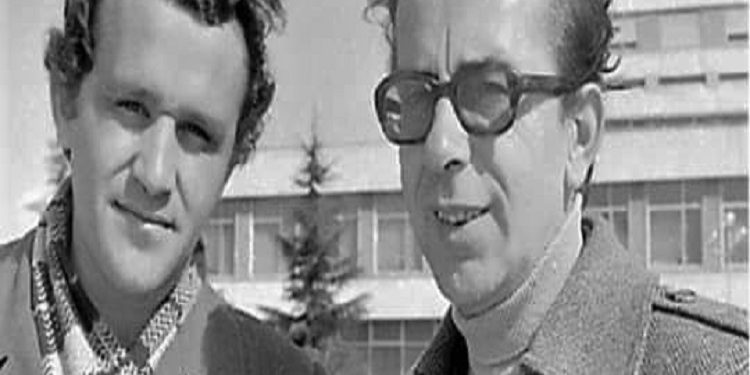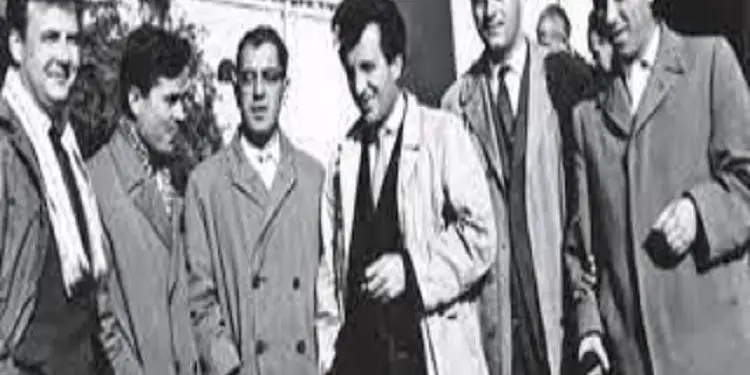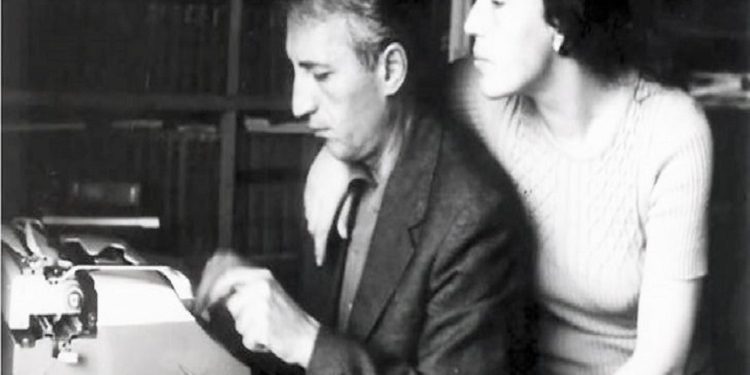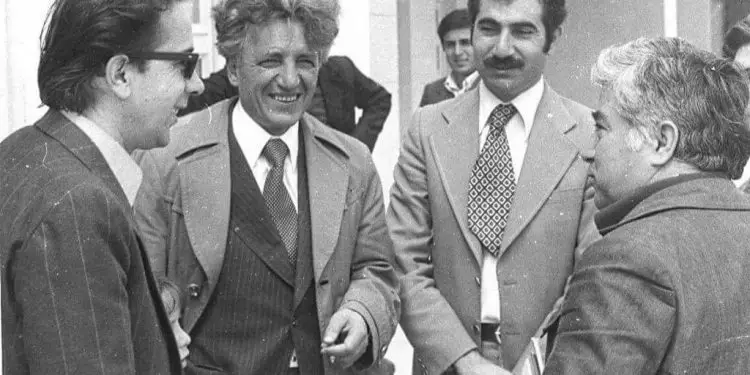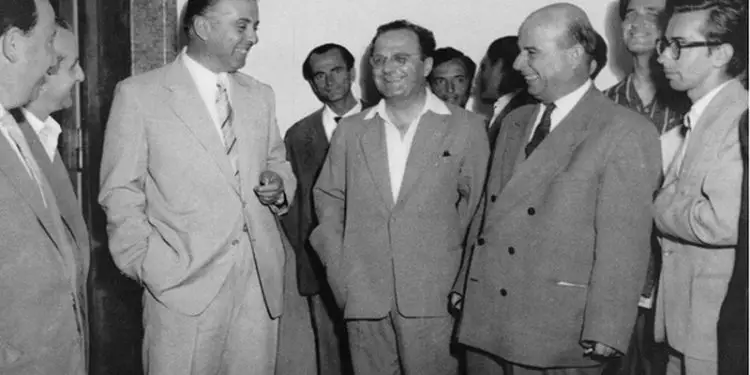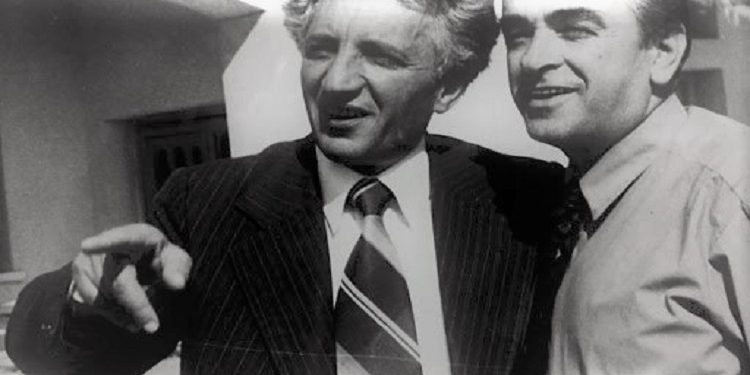By Skifter Këlliçi
The third part
-Piece of events from a historic meeting, with the participation of the dictator-
July 11, 1961, so 61 years ago…!
Enver Hoxha, although it was not announced that he would participate, suddenly came to a meeting with the intelligence of Tirana, where disturbing problems that had arisen in Albanian poetic creativity were discussed. Not only that, but from an attentive listener to the discussions of affirmed communist poets who harshly criticized young poets, who sought new paths and means of expression in poetic creativity, as well as an equally attentive listener to the answers of the latter. , strangely became a “judge” to establish peace between them. And this for reasons that will stand out in this dossier writing in some issues.
Continued from the previous issue
“In a sense,” Fatos Arapi continues, “Enver Hoxha’s speech overshadowed Ramiz Alia’s report, which was somewhat harsh with young people. His attitude towards the leaders of the Writers’ League must have been unexpected. Dhimitër Shuteriqi did not discuss at all. At the end of the meeting, he looked in the presidium very tired and anxious. Later from bad mouth, it was said that he had come to the meeting with two papers in his pocket. He would hold the one on whose side the scales were tilted. (Page 82).
The question arises: “Why did Enver Hoxha take such an attitude, that is, why did he give his hand to the young people?
Logically, approving the speech of Ramiz Alia, it would be enough to emphasize at the end of the meeting that young poets should heed the advice of old poets, so as not to deepen their mistakes, which are leading them to a creativity. poetics imbued with modernist influences, as pointed out by Andrea Varfi, Llazar Siliqi and Luan Qafzezi… and it is implied that young poets would be closed for a long time.
And, considering what happened a few years later when the so-called “revolutionization of the life of the country” began, with the circulation of staff and writers and artists to get to know the life of the country closely and in 1973 after the Plenum of 4- t of the Central Committee of the ALP, against the bourgeois-revisionist influences, which I have mentioned above, it is understandable that it is not known when we would have had in hand those well-known works of Ismail Kadare, Fatos Arapi, and many of many other poets who later appeared in our literature.
Enver Hoxha in this meeting supported the young poets, mainly because he saw that they were much more talented than the old poets. This was not very difficult to understand, especially by him. He had indeed gone to study in France, where he could not pass any exam, but let us not forget that he had graduated from the French Lyceum of Korça, where he was acquainted not only with the creativity of the best poets of the Albanian National Renaissance, but, above it all, with French and European literature and poetry.
Consequently, it was not difficult to discern what a great artistic difference the creations of the old poets had with the creations of the new poets, even from the few examples mentioned above. He needed the talent of young people, albeit in a modernist way. They would need him to weave verses for the Party, works that would remain, precisely because of their talent.
And in fact that is what happened. Our young poets, in addition to intimate and erotic lyrical poems, would be forced to write works where they would sing “to the heroic path of our Party glorious for the construction of socialism, its magnificent and courageous struggle against modern revisionism, for the preservation of the victories of our people achieved under its leadership and, above all, of himself, as the creator of this party, of these victories”.
He was not wrong: then there were the poems “Why are these mountains thought”, “Eagles fly high”, by Kadare, “Devoll, Devoll!”, “Fathers”, by Dritëro Agolli, “We belong to communism”, by Fatos Arapi, although in not to mention the word “party” anywhere, and then other young poets who dedicated themselves to the Party and himself, which even today remain in the history of Albanian literature as one of the best, despite the fact that the above poets cannot they never avoided the directives of the party and Enver Hoxha himself. These poets were obliged in one way or another to pay this tribute.
It is not in vain that in his book, “Albanian Literary Alternative”, the well-known Kosovar poet and critic, Agim Vinca writes about this issue:
Kadare explains this support to young writers as a maneuver to acquire them (young poets, my note – SK), as a bait thrown at them so that their talent would then benefit the regime. and the dictator himself. Despite the appearance, according to Kadare, that was devilish, this attitude of the head of the Party and the state as well as the liberal climate that was created in the late ’50s and early’ 60s, shqiptarë Albanian writers and used to significantly change the physiognomy of the hitherto very uniform Albanian literature and especially poetic creativity. ”(Cited work, page 71).
4
Echo of this meeting by Ernest Koliqi and Martin Camaj!
It should be noted that the developments of Albanian literature were closely followed by Albanian writers and scholars who were forced to leave the homeland with the usurpation of power by the communist regime. Such were, for example, Ernest Koliqi and Martin Camaj. In the magazine “Shejzat ‘(Year VII, 1963), which was published in Italy, a long article is written dedicated to Enver Hoxha’s meeting with old poets and young poets, which Fatos Arapi includes in full in his book” When they remember that I am “, where their assessments are given for this meeting.
Here are some excerpts from this article:
“In Albanian literature, the first good steps were taken and the cornerstones of the literary genres were laid before the communists came to power. This is so true that even today, after the scouting, sawing and grafting of the best writers, who found red, the ratio of young people to older people in Albania still stands approximately three to two in favor of young people.
And now, in order to see how Enver laid the penitents of Albania today, let’s take a look at his pathetic promise in the wide meeting with the writers (“Nëntori ‘Magazine, no. 8, August 1961), after the decisions of the 4th Congress of the ALP (Albanian Communist Party):
Therefore, this love, this loyalty and patriotism, which you nurture for the people and the homeland, (read the party), the party will reward you ten and a hundred times more with its care. The party is with you, the party is always up to date and you will always have the unlimited help and support of Paris and the Central Committee for every step you take. ”
The following article states:
“It should be noted here that this meeting resembles the decisions of the 4th Party Congress, held because of the political acrobatics committed by the red leadership of Tirana to kick Moscow and leave it in the lap of Beijing. Then it should be noted that Enver, the leader of the privileged crowd of writers, was confused and afraid of falling into traps suddenly, he is the intoxicating “super hypocrite” incense of nationalism….
Hec I say now that these writers and artists are not… “Soldiers who come out of the barracks according to the source of the burizan to show the force in the line and shout as loudly as they can -” one two, here, here, here… “!
All the trouble that grips the party to let go of the pen… is the fear of “sharpening the pen and creating a counter-revolution, like that of October 1956 in Hungary…”!
Ernest Koliqi and Martin Camaj, although far from their homeland, made a fair analysis of the situation created after the meeting of July 11, 1961…! Young and old poets, even if they did not want to, were forced to become obedient soldiers of the Party. Especially the young people, whose talent the dictator needed more than ever.
However, the debate shifts to the literary press!
Gurakuqi against Agoll
It should be noted that the beginning of the ‘60s was the period of some freedom of the press through debates in the literary press, where opposing views were also expressed (of course, not against the Party). It is astonishing how no signal came from the ‘Red Dome’, to interrupt these debates that were read with curiosity and interest and to somehow recall the debates and brainstorming of our intellectuals that had been seen in our press during the 1930s. But it should be added that at that time a kind of liberalism was blowing, which appeared especially in literary creativity and especially in poetry.
I say so because after the break-up of relations with the Soviet Union in 1961, and especially in 1963-64, censorship took effect immediately.
This resulted in a plenum of the League of Writers and Artists sharply criticizing two plays, namely Fatos Arap and Qamil Buxheli, “Drama of the nameless partisan” and “Duel”, which never saw the light of day. Worse, as I mentioned above, happened with the drama “White Siege”, by Naum Prifti, which appeared in the Korça Theater in 1964, which I mentioned at the beginning of this dossier.
But, back to the press debates about poetry. I have since preserved some articles that were published immediately after the July 11 meeting, which reflect a broad discussion, albeit not infrequently harsh, but, nevertheless constructive, which, as the poet and critic Agim Vinca describes it, “can to be considered a truly literary controversy. (“Albanian literary alternative”, page 59).
Although the dictator Enver Hoxha gave the ‘passport’ to the young poets, they still remained under the target of the old poets. I will try to reconstruct this debate through the study of Agim Vinca, published in the above book. What the critic and poet Mark Gurakuqi had not achieved, apparently to express in the July 11 meeting, he found the opportunity to address in a long article, entitled “Tradition and innovation, (” Light “, 13 and August 20, 1961), where, among other things, he wrote:
“In recent years, mostly young poets have started writing in a different way than before. The first step was taken by Ismail Kadareja and then some others such as Fatos Arapi, Dritëro Agolli, Halil Qendro, and even Dhori Qiriazi and Sander Gera, who usually wrote as if based on classical models. “I am not mentioning some names of beginners.”
Then Mark Gurakuqi’s language is no different from the language used by Andrea Varfi and Luan Qafëzezi in their discussions before Enver Hoxha. He is even harsh when he starts analyzing Kadare’s poetry:
“For me,” he writes, “this is in a good part of it, a controversial poem for several reasons, such as that of reducing the figure as a means in itself and, in some cases, of avoiding it by the tradition of our poetry… ”.
To illustrate his point, he takes the poem “Laçi” as an example and dwells on the verses:
“I see how a summer evening /
a highlander will come down from the mountain /
Like a compass on long legs.
He further singles out the verses:
“This city will wear proletarian overalls,
Will not choke while drinking tea,
Tucked into pajamas.
“How much do some of Kadare’s poems preserve the features of a national poetry?” – He then asks the question.
However, to ask this question and in this way, means to narrow the conception of the national, not to say that you do not understand this new conception, or, worse, that you do not want to perceive it. And this is because he does not tolerate such figures, which for the first time and boldly were being used by the young poet, who broke the taboo set by a law unwritten by the old poets, including Mark Gurakuqi…! Memorie.al
The next issue follows




